Pope Benedict XVI on Newman
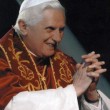 Newman was a high profile intellectual and a man of luminous spirituality.
Newman was a high profile intellectual and a man of luminous spirituality.
Benedict XVI’s Homily in Viterbo/Italy during his pastoral visit on September 6th.
 Newman was a high profile intellectual and a man of luminous spirituality.
Newman was a high profile intellectual and a man of luminous spirituality.
Benedict XVI’s Homily in Viterbo/Italy during his pastoral visit on September 6th.
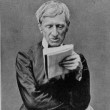 Westminster Cathedral, 2nd May 2009
Westminster Cathedral, 2nd May 2009
It is fitting to recall and to give thanks for past benefits of which we are the beneficiaries down to the present day. That is particularly appropriate on the occasion of an anniversary of jubilee. Our celebration today has precisely this purpose: we commemorate the 150th Anniversary of the foundation of The Oratory School by John Henry Cardinal Newman.
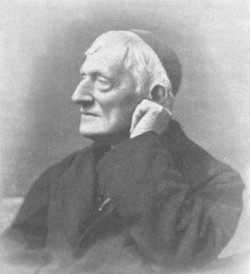 Pope Benedict XVI recognised the healing of Deacon Jack Sullivan in 2001 as a miracle resulting from the intercession of the Venerable Servant of God John Henry Newman.
Pope Benedict XVI recognised the healing of Deacon Jack Sullivan in 2001 as a miracle resulting from the intercession of the Venerable Servant of God John Henry Newman.
read more in …
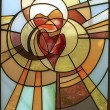 Snider Carlo
Snider Carlo
1. Newman on the eve of his elevation to the office of cardinal
The elevation of John Henry Newman to the dignity of the office of cardinal can be seen as the apotheosis of his sorely tried life. Thus, one ought to attribute to him the full and definitive rehabilitation of the thinker-theologian, subjected to mysterious accusations, malevolent insinuations and systematic criticism for many years. One need only consider the drastic judgement of Monsignor Talbot, Chamberlain to Pius IX, and one of Newman’s most implacable adversaries. He was principally responsible for the diffidence within Roman circles shown to the convert and for the measures taken following upon this attitude, including those which impeded him from returning to Oxford. [1] Talbot wrote to Cardinal Manning, Archbishop of Westminster,[2] hoping to find a sympathetic ear: “Dr. Newman is the most dangerous man in England.”
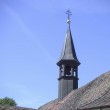 Were it otherwise, had he not confidence in the darkest day, and the most hostile district, he would be relinquishing a principal note, as it is called, of the Church. She is Catholic, because she brings a universal remedy for a universal disease.
Were it otherwise, had he not confidence in the darkest day, and the most hostile district, he would be relinquishing a principal note, as it is called, of the Church. She is Catholic, because she brings a universal remedy for a universal disease.
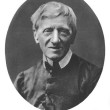 A strange time this may seem to some of you, my brethren, and a strange place, to commence an enterprise such as that, which relying on God’s mercy, we are undertaking this day. In this huge city, amid a population of human beings, so vast that each is solitary, so various that each is independent, which, like the ocean, yields before and closes over every attempt made to influence and impress it,-in this mere aggregate of individuals, which admits of neither change nor reform, because it has no internal order, or disposition of parts, or mutual dependence, because it has nothing to change from and nothing to change to, where no one knows his next-door neighbour, where in every place are found a thousand worlds, each pursuing its own functions unimpeded by the rest-how can we, how can a handful of men, do any service worthy of the Lord who has called us, and the objects to which our lives are dedicated?
A strange time this may seem to some of you, my brethren, and a strange place, to commence an enterprise such as that, which relying on God’s mercy, we are undertaking this day. In this huge city, amid a population of human beings, so vast that each is solitary, so various that each is independent, which, like the ocean, yields before and closes over every attempt made to influence and impress it,-in this mere aggregate of individuals, which admits of neither change nor reform, because it has no internal order, or disposition of parts, or mutual dependence, because it has nothing to change from and nothing to change to, where no one knows his next-door neighbour, where in every place are found a thousand worlds, each pursuing its own functions unimpeded by the rest-how can we, how can a handful of men, do any service worthy of the Lord who has called us, and the objects to which our lives are dedicated?
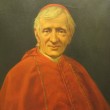
Vi ringrazio, Monsignore, per la participazione che m’avete fatto dell’ alto onore che il Santo Padre si è degnato conferire sulla mia umile persona—
And, if I ask your permission to continue my address to you, not in your musical language, but in my own dear mother tongue, it is because in the latter I can better express my feelings on this most gracious announcement which you have brought to me than if I attempted what is above me.
First of all then, I am led to speak of the wonder and profound gratitude which came upon me, and which is upon me still, at the condescension and love towards me of the Holy Father in singling me out for so immense an honour. It was a great surprise. Such an
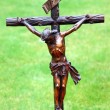 “Who, in the days of His flesh, when He had offered up prayers and supplications with strong crying and tears unto Him that was able to save Him from death, and was heard in that He feared, though He were a Son, yet learned He obedience by the things which He suffered.” Hebrews 5:7, 8.
“Who, in the days of His flesh, when He had offered up prayers and supplications with strong crying and tears unto Him that was able to save Him from death, and was heard in that He feared, though He were a Son, yet learned He obedience by the things which He suffered.” Hebrews 5:7, 8.
The chief mystery of our holy faith is the humiliation of the Son of God to temptation and suffering, as described in this passage of Scripture. In truth, it is a more overwhelming mystery even than that which is involved in the doctrine of the Trinity. I say, more overwhelming, not greater –
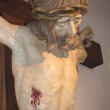 “And I, if I be lifted up from the earth, will draw all men unto Me.” John 12: 32.
“And I, if I be lifted up from the earth, will draw all men unto Me.” John 12: 32.
A GREAT number of men live and die without reflecting at all upon the state of things in which they find themselves. They take things as they come, and follow their inclinations as far as they have the opportunity. They are guided mainly by pleasure and pain, not by reason, principle, or conscience; and they do not attempt to interpret this world, to determine what it means, or to reduce what they see and feel to system. But when persons, either from thoughtfulness of mind, or from intellectual activity, begin to contemplate the visible state of things into which they are born, then forthwith they find it a maze and a perplexity. It is a riddle which they cannot solve. It seems full of contradictions and without a drift. Why it is, and what it is to issue in, and how it is what it is, and how we come to be introduced into it, and what is our destiny, are all mysteries.
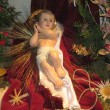 May each Christmas, as it comes, find us more and more like Him, who as at this time became a little child for our sake, more simple-minded, more humble, more holy, more affectionate, more resigned, more happy, more full of God.
May each Christmas, as it comes, find us more and more like Him, who as at this time became a little child for our sake, more simple-minded, more humble, more holy, more affectionate, more resigned, more happy, more full of God.